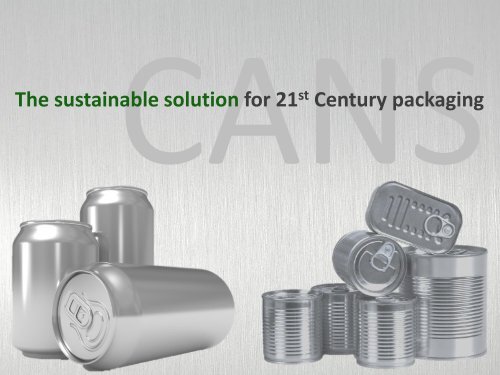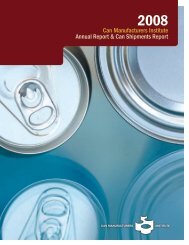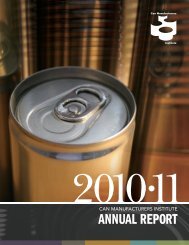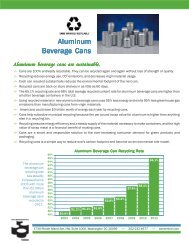Sustainability Report - Can Central
Sustainability Report - Can Central
Sustainability Report - Can Central
You also want an ePaper? Increase the reach of your titles
YUMPU automatically turns print PDFs into web optimized ePapers that Google loves.
The sustainable solution for 21 st Century packaging
Packaging and <strong>Sustainability</strong><br />
Our natural world is being degraded and finite resources are being depleted as<br />
global population rises and developing nations grow their economies. That<br />
begs the question, how can we meet the needs of today without impairing<br />
the ability of our children and grandchildren to meet theirs?<br />
Providing the goods and services that fuel our economy must be done in a way<br />
that places the least stress on an already overly burdened planet. Packaging is<br />
no exception. Endlessly recyclable aluminum and steel cans provide an<br />
example of the positive role packaging can play in supporting a sustainable<br />
society.<br />
First, the can is the most recycled food and beverage container in the U.S. This<br />
greatly reduces the amount of material going to landfills.
Second, cans are made with more recycled content than most package types,<br />
which reduces the demand for new natural resources. And the natural<br />
resources that are required – aluminum or iron – are, respectively, the third and<br />
fourth most abundant materials on Earth.<br />
Finally, cans offer the best protection for the product inside. No other package<br />
provides a longer shelf life, better preserves product quality and offers greater<br />
protection against spoilage and food borne pathogens.<br />
The can clearly stands as the sustainable solution for<br />
21 st Century packaging.
The <strong>Can</strong> is the Sustainable Solution.<br />
Here’s why:<br />
1. <strong>Can</strong>s are the most recycled food and beverage package in<br />
the United States.<br />
2. <strong>Can</strong>s are produced with abundant and recycled materials.<br />
3. <strong>Can</strong>s save energy.<br />
4. <strong>Can</strong>s ensure safe, nutritious food and beverages.<br />
5. <strong>Can</strong>s prevent spoilage and product waste.<br />
6. <strong>Can</strong>s are economically efficient.
1. <strong>Can</strong>s are the most recycled food and<br />
beverage package in the United States.<br />
Minimizing landfill waste<br />
The can is the sustainable solution.
1 Steel Recycling Institute, 2011 rate<br />
2 Aluminum Association, 2011 rate<br />
3 EPA’s 2010 MSW Characterization <strong>Report</strong><br />
4 EPA ‘s 2009 MSW Characterization <strong>Report</strong><br />
5 EPA lists a broad category of “bags and wraps” in its recycling data, but does not break out flexible plastic packaging. The Flexible Packaging<br />
Association does not claim that flexible packaging is recyclable and instead claims that flexible containers are “pre-cycled.”<br />
Food and Beverage Package<br />
Recycling Rates<br />
Steel food can (70.8%)<br />
1<br />
Aluminum beverage can (65.1%)<br />
2<br />
Glass (33.4%)<br />
PET (29.2%)<br />
Aseptic cartons (6.5%)<br />
3<br />
3<br />
4<br />
Recycled<br />
Not-Recycled<br />
Flexible packaging (0%)<br />
5<br />
0% 20% 40% 60% 80% 100%
Recycling facts: Aluminum cans<br />
‣ The highest recycling rate of all<br />
beverage packages in the U.S.<br />
‣ 100% recyclable<br />
‣ Endlessly recyclable<br />
‣ Due to the high value of aluminum,<br />
cans self-finance their recycling<br />
‣ Aluminum cans have a true closedloop<br />
recycling process with old cans<br />
being recycled into new cans
Recycling facts: Steel cans<br />
‣ The highest recycling rate<br />
among food packages in the U.S.<br />
‣ 100% recyclable<br />
‣ Because of its magnetic<br />
properties, steel can be easily<br />
reclaimed from the waste<br />
stream and recycled endlessly<br />
‣ Steel is the most recycled<br />
material globally<br />
The can is the sustainable solution.
2. <strong>Can</strong>s are produced with abundant<br />
and recycled materials.<br />
Minimizing natural resource depletion<br />
The can is the sustainable solution.
The can minimizes resource depletion.<br />
Here’s why:<br />
1. The virgin materials that go into a can<br />
– aluminum or iron – are the third<br />
and fourth most abundant elements<br />
on Earth.<br />
2. <strong>Can</strong>s have high recycled content.<br />
Aluminum beverage cans average<br />
68% recycled content.<br />
3. Because cans are endlessly<br />
recyclable, they provide continuous<br />
feedstock for new cans.
Metal: A permanent resource for current<br />
and future generations.<br />
Credit:<br />
Metal has<br />
many<br />
applications.<br />
Ore supplies are<br />
abundant, and once<br />
extracted, are<br />
permanently<br />
available and<br />
endlessly<br />
recyclable.
1 Aluminum Association. 2011.<br />
2 “Lifecycle Analysis of Aluminum Beverage <strong>Can</strong>s,” Prepared May 21, 2010 for Aluminum Association<br />
Aluminum: Nearly 75% of all aluminum<br />
that’s ever been produced is still in use. 1<br />
It just keeps coming back in the form of new products.<br />
In the case of a beverage can, it can be recycled<br />
and back on a store shelf in just 60 days. 2<br />
60 Days<br />
60 Days<br />
60 Days
80-90% of all steel ever produced<br />
is still in use. 1<br />
Metal maintains its molecular structure<br />
throughout the recycling process,<br />
enabling it to be endlessly recycled into<br />
new steel products, such as cars,<br />
bridges or other cans.<br />
Chances are, the next can you pick up will<br />
contain metal that was used by your<br />
grandparent’s generation and will someday<br />
be used by your grandchildren’s<br />
generation. Reusing limited resources<br />
over and over epitomizes sustainability.<br />
1<br />
World Steel. 2011.
Less metal is needed to produce today’s cans<br />
In addition to high recycled content, cans also require less metal<br />
today. Over the past two decades, innovations in “light weighting”<br />
technology have enabled the industry to reduce the amount<br />
aluminum and steel needed to produce each can.<br />
15% reduction in aluminum since 1993 1<br />
31% reduction in steel since 1990 2<br />
1<br />
“Lifecycle Analysis of Aluminum Beverage <strong>Can</strong>s.” Aluminum Association. May 21, 2010.<br />
2<br />
“<strong>Sustainability</strong> and Steel Packaging.” www.steel.org. American Iron and Steel Institute. 2011.
3. <strong>Can</strong>s save energy.<br />
Reducing pollution and carbon emissions<br />
The can is the sustainable solution.
The can’s endless recyclability also saves<br />
significant energy.<br />
Being endlessly recyclable doesn’t just cut down on landfill space and the need<br />
for raw materials. Each can that is recycled greatly reduces the energy and<br />
therefore the carbon footprint of the next. That’s because it takes far less<br />
energy to produce the aluminum and steel for a can when using recycled<br />
material.<br />
Energy savings:<br />
Energy savings:<br />
95% 1<br />
75% 2<br />
1<br />
“Lifecycle Analysis of Aluminum Beverage <strong>Can</strong>s,” Prepared May 21, 2010 for Aluminum Association<br />
2<br />
“Facts About Steel Recycling.” Steel Recycling Institute. 2010.
Every can recycled saves energy:<br />
=<br />
X 1 hour<br />
1 x<br />
=<br />
1 load laundry<br />
Source: Woods, Jim. Steel Recycling Institute. 2010.
Every can recycled saves energy:<br />
=<br />
X 3 hours<br />
1 x<br />
=<br />
100 w<br />
X 4 hours<br />
Source: “Facts About Aluminum Recycling.” Earth911.org. 2011.
And the energy savings don’t stop there.<br />
Product packaged in cans never requires freezing or<br />
refrigeration. In fact, canned foods require no energy at all<br />
during storage. 1 This saves energy for producers, shippers,<br />
retailers and consumers.<br />
1<br />
“From Farm to Table: An Energy Consumption Assessment of Refrigerated, Frozen and <strong>Can</strong>ned Food Delivery.” Kirsten Ritchie, B.S., M.S., P.E.,<br />
Scientific Certification Systems. 2005.
4. <strong>Can</strong>s ensure safe, nutritious food<br />
and beverages.<br />
Providing the highest degree of product quality<br />
The can is the sustainable solution.
Best protection for food and beverages<br />
Food and beverages packed in cans are protected by<br />
the most robust package available.<br />
The durable metal exterior, combined with an airtight<br />
seal, locks in the product’s quality, while locking out<br />
germs, air, light and other elements that degrade<br />
product quality and threaten consumer health.<br />
It’s the most tamper-resistant and tamper-evident<br />
package on the market.
Best protection against food-borne illnesses<br />
Furthermore, the canning process<br />
itself kills off bacteria and other<br />
harmful agents, ensuring safe and<br />
nutritious food for the consumer.<br />
According to the CDC, 48 million<br />
Americans fall ill and 3,000 die every<br />
year from food-borne diseases. 1 Foodborne<br />
illnesses cost Americans $77.7<br />
billion annually. 2<br />
The durable structure and air-tight seal<br />
on cans offers the most robust<br />
protection against food-borne illnesses.<br />
1<br />
“Estimates of Foodborne Illness in the United States.” www.cdc.gov. Centers for<br />
Disease Control and Prevention. 2011.<br />
2<br />
Journal of Food Protection. January 2012.
Farm-fresh quality long after the harvest<br />
<strong>Can</strong>ned food is picked at the peak of ripeness and immediately canned, locking<br />
in its flavor and nutrition.<br />
<strong>Can</strong>s ensure farm-fresh taste and nutrition long after the product was<br />
harvested.<br />
There are myths that canned food contains preservatives and that its nutritional<br />
value is degraded. The fact is, most canned food is packed in just water or<br />
another liquid, with other ingredients sometimes added for flavor. And studies<br />
have shown that fresh, frozen and canned foods have about the same nutritional<br />
value at the time of consumption. 1<br />
1<br />
“Nutritional Comparison of Fresh, Frozen and <strong>Can</strong>ned Fruits and Vegetables.” Joy C. Rickman, Diane M. Barrett, PhD, Christine M. Bruhn, Phd.
Better for the beer. Better for the Earth.<br />
<strong>Can</strong>s also offer better protection of beverage quality.<br />
Take beer for example. Its two greatest enemies are air and light and cans offer<br />
complete protection against both. It’s not surprising that a canned revolution is<br />
underway in the craft beer market, with more than 300 craft beers now<br />
available in cans.<br />
There is no dispute that only cans provide complete protection of beverage<br />
quality. And due to the can’s protective coating, the beer or other beverage<br />
maintains its true taste.
5. <strong>Can</strong>s minimize spoilage and<br />
product waste.<br />
Reducing food waste benefits consumers & society<br />
The can is the sustainable solution.
Food waste: A problem for consumers,<br />
producers, retailers and society<br />
Nearly half of all food grown in the<br />
U.S. goes to waste.<br />
According to a study by the University of Arizona,<br />
funded in part by the USDA, 40-50% of all<br />
harvestable food in the U.S. is discarded. 1<br />
Food waste also poses significant environmental<br />
problems. According to the EPA, food waste is now<br />
the single largest component of the landfill stream –<br />
a staggering 34 million tons of food is wasted each<br />
year. 2<br />
1<br />
Timothy Jones, PhD, Bureau of Applied Research in Anthropology, University of Arizona. 2004.<br />
2<br />
“Basic Information About Food Waste.” www.epa.gov. U.S. Environmental Protection Agency. 2011.
Solution: <strong>Can</strong>s<br />
<strong>Can</strong>s help minimize food waste by providing the<br />
longest shelf life of any package.<br />
Food packed in cans is protected from<br />
air, germs and other factors that cause it<br />
to spoil.<br />
Less spoilage = less waste.
Solution: <strong>Can</strong>s<br />
A recent study by the USDA Economic Research Service<br />
examined fresh, frozen and canned varieties of various<br />
fruits and vegetables. For many of the products examined,<br />
canned varieties had the lowest consumer loss estimate. 1<br />
Example: Sweet Corn<br />
Type Consumer loss 2<br />
Fresh 32%<br />
Frozen 36%<br />
<strong>Can</strong>ned 7%<br />
1<br />
“Consumer-Level Food Loss Estimates and their Use in the ERS Loss-Adjusted Food Availability<br />
Data.” USDA Economic Research Service. 2011.<br />
2<br />
The estimates for frozen and canned come from USDA ERS’s revised consumer loss estimates.<br />
A revised figure for fresh corn is yet to be determined; the figure cited in this example is from<br />
USDA ERS’s previous estimate.
Solution: <strong>Can</strong>s<br />
Example: Peaches<br />
Type Consumer loss<br />
Fresh 42%<br />
Frozen 35%<br />
<strong>Can</strong>ned 8%
6. <strong>Can</strong>s are economically efficient.<br />
Saving money for producers, retailers & consumers<br />
The can is the sustainable solution.
Economical to ship and store<br />
Shipping efficiencies<br />
The can’s light weight and cubic efficiency allows<br />
more product to be shipped using less fuel.<br />
Energy savings<br />
Product packaged in cans requires no<br />
refrigeration or freezing, saving money<br />
through warehousing, shipping and<br />
retailing.
Less food and beverage waste = Less money waste<br />
“…[S]ince we now throw away more food than anything else, that means we are throwing<br />
away a lot of our money. Often, simple changes in food purchasing, storage and preparation<br />
practices can yield significant reductions in food waste generation.” – U.S. EPA 1<br />
Food waste costs the U.S. economy more than<br />
$1 billion each year. 2<br />
The average family of four throws away nearly<br />
$600 annually in food waste. 2<br />
<strong>Can</strong>s help minimize food and beverage waste by<br />
providing the longest shelf life of any package.<br />
That means more profit for producers and retailers,<br />
and more money in the pockets of consumers.<br />
1 “Basic Information About Food Waste.” www.epa.gov. U.S. Environmental Protection Agency. 2011.<br />
2 Timothy Jones, PhD, Bureau of Applied Research in Anthropology, University of Arizona. 2004.
In summary:<br />
No package is perfect. Each one necessarily requires some degree of<br />
energy or natural resource inputs. The key is to determine which<br />
package provides the greatest overall benefit to consumers and<br />
society.<br />
That package is the can.<br />
It has the highest recycling rate, minimizing landfill<br />
waste. It is made from recycled and abundant<br />
materials, minimizing the depletion of scarce<br />
resources. And it’s the most durable and robust<br />
container, maximizing shelf life and ensuring the<br />
highest degree of product quality.<br />
Further, it’s light weight, cubic efficiency and lack of<br />
need for refrigeration or freezing allows it to be<br />
shipped and stored at an economical cost.
In summary:<br />
We in the can industry are proud of our environmental record. We have<br />
worked hard to increase recycling rates, reduce the amount of metal<br />
required to make a can and lessen our energy and carbon footprint.<br />
But we’re not resting on our laurels. With the dedication and ingenuity of<br />
our more than 33,000 employees in the U.S., we are continually striving<br />
to build upon our environmental record. We challenge other packages to<br />
do the same.<br />
The can is the sustainable solution<br />
for 21 st Century packaging.
Prepared by:<br />
www.cancentral.com/sustainability





